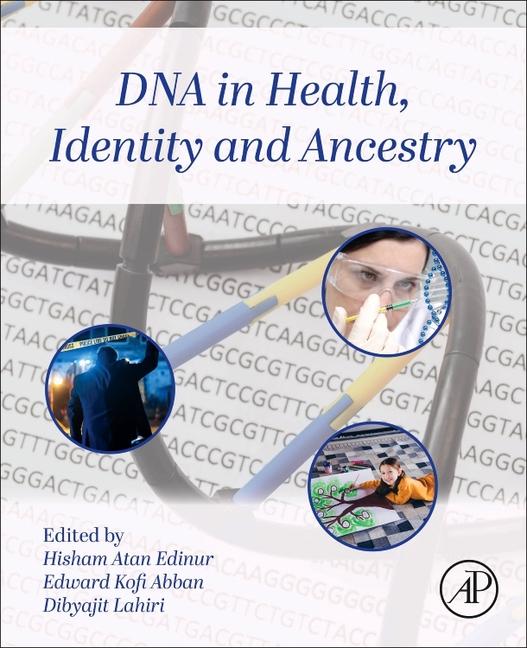
Zustellung: Fr, 14.11. - Di, 18.11.
Noch nicht erschienen
VersandkostenfreiBestellen & in Filiale abholen:
DNA in Health, Identity and Ancestry examines the human genome and advances in molecular techniques in relation to their value in health, genetic ancestry, and forensic DNA. This book systematically presents these three areas, providing new insights into recent developments in these fields, including gene editing, ancestral fraction determination, and DNA profiling. It covers the latest advances in molecular biology to understand the pertinent issues in these areas. DNA in Health, Identity and Ancestry provides an introduction to human genomes, and then delves into health, forensics and ancestry across 36 chapters. Each section is concluded with practical case studies to demonstrate the application of the principles discussed in each respective section. This book is a valuable resource for researchers, practitioners, and postgraduate students in biochemistry, molecular biology and genetics. It not only provides them with fundamental knowledge on genetics, diseases, population genetics and forensic DNA, but also presents advances, technical operational standards, analytical tools and recent developments in these respective areas.
Inhaltsverzeichnis
1. Introduction to human genomes: nuclear and mitochondrial DNA
2. Genetic testing
3. Pharmacogenomics: current status and future prospects
4. Molecular diagnostics for infectious diseases
5. Donor and recipient matching for transfusion and transplantation surgery
6. Circulating DNA: origins, functions and profiling
7. Metagenomics of environmental samples
8. DNA extraction methods for pathogen analysis
9. DNA extraction methods for food analysis
10. Characterization and application of environmental DNA in multi-species biofilms
11. Y-chromosome: genetics, function and disease
12. X-chromosome: genetics, function and disease
13. Case study
14. STR (autosomal, Y and X chromosomes) and mtDNA profiling for casework and paternity cases
15. DNA databanking, hit matches and ethical issues
16. DNA profiling: technical and operating standards
17. Current progress in rapid DNA profiling and legal requirements
18. Forensic parameters inferred using autosomal STR data
20. Forensic parameters inferred using Y-STR population data
21. Forensic parameters inferred using X-STR data
22. Forensic parameters inferred using mtDNA data
23. Validation of newly developed STR typing kit
24. Developmental validation of extraction protocols for extracting DNA from crime scene samples
25. Novel markers for casework and paternity cases
26. Food forensics
27. Case study
28. Population genetics: markers and bioinformatics
29. Archaeogenetics of human history
30. Ancient DNA extraction and amplification techniques
31. Origins and migration patterns of indigenous people
32. Analysis of human leukocyte population data
33. Analysis of KIR population data
34. Analysis of genome wide SNP data
35. Genetic ancestry and health
36. Whole-genome sequence data and population structure
37. Admixture and selection in human evolution
38. Case study
39. Concluding remarks
2. Genetic testing
3. Pharmacogenomics: current status and future prospects
4. Molecular diagnostics for infectious diseases
5. Donor and recipient matching for transfusion and transplantation surgery
6. Circulating DNA: origins, functions and profiling
7. Metagenomics of environmental samples
8. DNA extraction methods for pathogen analysis
9. DNA extraction methods for food analysis
10. Characterization and application of environmental DNA in multi-species biofilms
11. Y-chromosome: genetics, function and disease
12. X-chromosome: genetics, function and disease
13. Case study
14. STR (autosomal, Y and X chromosomes) and mtDNA profiling for casework and paternity cases
15. DNA databanking, hit matches and ethical issues
16. DNA profiling: technical and operating standards
17. Current progress in rapid DNA profiling and legal requirements
18. Forensic parameters inferred using autosomal STR data
20. Forensic parameters inferred using Y-STR population data
21. Forensic parameters inferred using X-STR data
22. Forensic parameters inferred using mtDNA data
23. Validation of newly developed STR typing kit
24. Developmental validation of extraction protocols for extracting DNA from crime scene samples
25. Novel markers for casework and paternity cases
26. Food forensics
27. Case study
28. Population genetics: markers and bioinformatics
29. Archaeogenetics of human history
30. Ancient DNA extraction and amplification techniques
31. Origins and migration patterns of indigenous people
32. Analysis of human leukocyte population data
33. Analysis of KIR population data
34. Analysis of genome wide SNP data
35. Genetic ancestry and health
36. Whole-genome sequence data and population structure
37. Admixture and selection in human evolution
38. Case study
39. Concluding remarks
Produktdetails
Erscheinungsdatum
01. November 2025
Sprache
englisch
Seitenanzahl
425
Herausgegeben von
Hisham Atan Edinur, Edward Kofi Abban, Dibyajit Lahiri
Verlag/Hersteller
Produktart
kartoniert
ISBN
9780443339479
Bewertungen
0 Bewertungen
Es wurden noch keine Bewertungen abgegeben. Schreiben Sie die erste Bewertung zu "DNA in Health, Identity, and Ancestry" und helfen Sie damit anderen bei der Kaufentscheidung.









